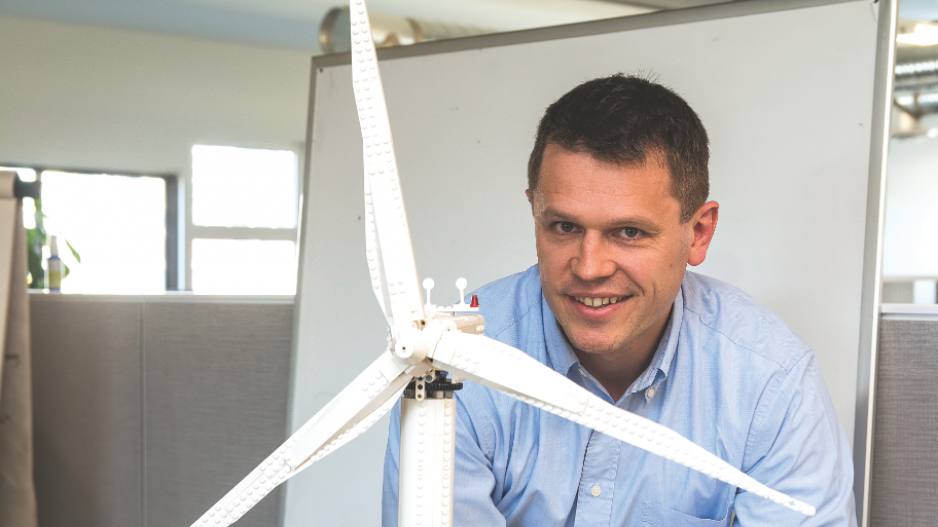Steve Oldham is of two minds about the potential for more investment in technologies tackling climate change.
One the one hand, the pandemic may significantly slow efforts to address climate change as governments and individuals prioritize economic recovery at any cost.
But the CEO of Carbon Engineering, a clean-technology (cleantech) company based in Squamish, is optimistic about the second possibility:
“We just caught a glimpse over the last few months of what happens when we ignore a problem,” said Oldham, whose company is best known for developing direct carbon-capture plants that pull carbon dioxide out of the atmosphere. “We all wish today we could have set up a much more extensive pandemic testing system and had our relevant medical authorities all ready with this type of protection.
“Climate protection is the same. We can’t stop it, it’s coming, and we can either choose to address it now or wait to feel the impact later. And the impact will be similar: it will have a massive economic effect.”
His sentiments are echoed by Craig Alexander, chief economist at Deloitte Canada, who urged governments in his latest economic outlook to use their COVID-19 policy actions to accelerate the shift to a less carbon-intensive economy.
Alexander pointed to the federal government’s recent program to address orphan wells in the energy sector as one example of efforts already underway.
“I don’t think we’ve seen all the fiscal announcements,” he told Business in Vancouver. “I still think as we’re reopening and the economy’s recovering, you’re going to have governments that are going to want to put in place fiscal stimulus measures like they do during normal recessions to try and stimulate the economy when it’s weak.
“Some of that stimulus is going to take the form of infrastructure. And when you’re doing large-scale infrastructure projects, boy, there’s an opportunity to prioritize those that will also help you achieve your climate goals.… Similarly, when businesses are thinking about transforming their business models, there’s a real opportunity.”
And just as B.C. was entering Phase 2 of its economic restart plan early last month, Vancouver-based Clir Renewables Inc. revealed it was rolling out a platform that deploys its artificial-intelligence-powered optimization technology into the solar asset sector.
The company is best known for technology helping owner-operators boost the output of wind farms and other wind power assets.
For CEO Gareth Brown, the expansion into solar comes at a time when businesses are being evermore diligent about financial considerations.
“When you have a better technical understanding of your asset, you’ve got a higher certainty of the production going forward and that allows you to borrow more money and get better financial returns on the asset,” he said.
“When the crash happened in 2008, all of the governments invested in green tech because of the threat of climate change. So the fundamentals of our current client base – these solar panels, these wind farms – are not being taken down. They’re still going to have the same challenges and opportunities on them. But once the recovery starts kicking in, we’re going to see larger investment and stimulus to get a green grid.”
Last month, California regulators passed new regulations requiring the adoption of zero-emission commercial trucks in the coming years.
The move drew plaudits from Burnaby-based Ballard Power Systems (TSX:BLDP), known for developing hydrogen fuel cells for vehicles.
Orders from the cleantech company’s fuel cell modules have remained steady amid the pandemic, drawing a follow-on order last month for 15 fuel cells to be deployed on buses in the U.K. as well as a separate order in April for 20 fuel cell modules for buses in the Netherlands.
As for direct B.C. investment put into play since the pandemic, Carbon Engineering broke ground on a new facility in Squamish three months into the COVID-19 crisis.
There, it intends to continue testing and refining its carbon-capture technology as it licenses it to governments and companies throughout the world.
The B.C. company is still in the commercialization process, but its technology has caught the eyes of investors such as Microsoft Corp. (Nasdaq:MSFT) co-founder Bill Gates and Murray Edwards, executive chairman of Canadian Natural Resources Ltd. (TSX:CNQ).
“I think there is a chance for government, in setting policy and looking at various stimulus and recovery packages, to emphasize the need for addressing climate change,” Oldham said. “I’m not naïve in this. It has to be balanced against the very real need to get people back to work.”
Breaking ground on a new facility mid-pandemic might seem bold, but the company is still benefiting from last year’s close of a US$68 million equity financing round.
But it’s been more of a mixed bag for early-stage companies, according to Jeanette Jackson, CEO of the Foresight Cleantech Accelerator Centre in Vancouver.
“The initial response from cleantech companies was nervousness around revenue, investments and sales funnels.… A lot of these companies are pre-revenue so they don’t have access to a lot of the funding that was provided at the federal level,” she said, referring to programs requiring businesses to show declines in revenue in wake of the pandemic.”
In April, though, the federal government unveiled a $250 million initiative aimed at pre-revenue innovation companies through the National Research Council of Canada Industrial Research Assistance Program.
“One of the biggest challenges right now for pure tech companies, whether it’s cleantech or healthtech – they need more than a computer. They need lab space and equipment to do their jobs, and, unfortunately, a lot of those facilities are still closed,” Jackson said. “But with all of that uncertainty and chaos, we are seeing some light at the end of the tunnel. These companies have had the opportunity to focus on business development, customer engagement.”
She added one continuing concern for the industry is the tendency for Canadian policymakers to remain risk-averse compared with their international counterparts.
“Risk is not as common in Canada politics,” Jackson said. “But I think that’s changing a little now that climate’s top of mind.”




